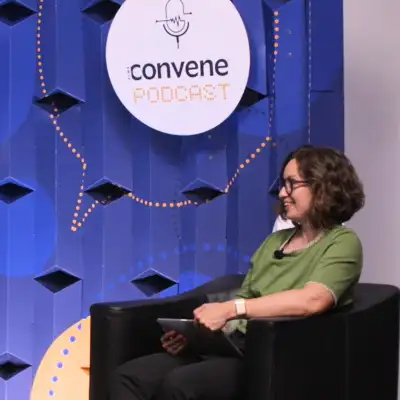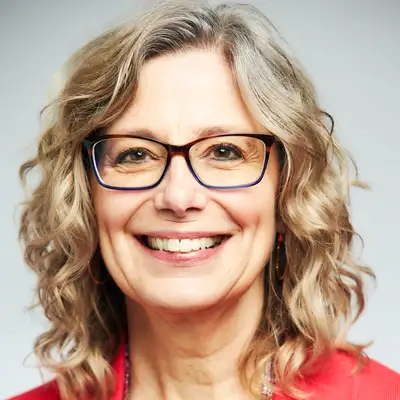Creators and Guests
What is PCMA Convene Podcast?
Since 1986, Convene has been delivering award-winning content that helps event professionals plan and execute innovative and successful events. Join the Convene editors as we dive into the latest topics of interest to — and some flying under the radar of — the business events community.
Convene Talk, ep. 61/May 2, 2025
*Note: the transcript is AI generated, excuse typos and inaccuracies
Magdalina Atanassova: This is the Convene Podcast.
Hey, everyone, it's Maggie here. Before we jump into this episode, I wanted to say that we had experienced some technical issues during the recording that we were not aware of.
The audio is not perfect, but I hope you can bear with us because the discussion is really good and we still wanted to share it in the original way that that we recorded it.
Thank you for sticking with it and supporting us.
Now back to the program.
Welcome to another episode of the Convene Talk. Jen, what are we discussing today?
Jennifer N. Dienst: Thanks, Maggie. So today we're going to chat about a new research report that was just released by Destinations International along with future partners. It's titled Destination Responding to Societal Issues. I just found that there were some really interesting takeaways from this report that even though it was conducted Primarily in late 2024,
I think it kind of mirrors what we're seeing happen now. So I'm going to briefly just kind of touch on some of the bigger takeaways and then we can chat about some of the more interesting developments they spotted.
So just a little background. They surveyed around 400 planners last fall, but they also included some feedback from actual meeting attendees as well.
So one of the biggest takeaways that they found, and this is all kind of revolving around what factors deter attendees and event organizers from choosing a destination for a meeting.
So beyond like the obvious, like dates, rates, and space, planners considered accessibility,
reputation for safety, service levels, and welcoming atmosphere to be the most important factors when they're evaluating a destination for a future meeting or event.
Far and away, the number one factor that impacts meeting destination selection was reputation for safety. In fact, nearly 80% said that they avoid destinations with safety concerns. And when it comes to specific safety concerns, the highest ranking number one, was gun violence.
That was followed by negative press. So perception is still a really big consideration. If a destination is getting a lot of negative media attention,
that's. That's a really big concern for meeting planners and then social issues like protest.
Also, 64% of planners said that they would avoid a specific destination due to politics or policies,
which I thought was really interesting. This was also echoed in the survey by travelers who were interviewed. I'm quoting from the report. While personal safety is the most important consideration among all American travelers group meetings, travelers place greater importance on social issues and politics when deciding where they want to travel.
So I thought this was interesting because even though this survey was done last fall, we're actually seeing this happen in real time to the United States. So as we're seeing These developments happen as a result of the current administration.
We're seeing an increasing number of travelers and event organizers choose to cancel or relocate their meetings events from the US And I'm going to cite a story, it was from Canadian outlet CTV News,
and they interviewed some experts in business travel, including someone from Flight Center Travel Group Canada, who said that business travel by air between the two countries has declined by almost 40% year over year.
And when you compare February 2025 to February 2024,
their managing director said that they've seen a lot of cancellations for conferences that were meant to be in the US and they cited a number of other conference companies that have been pulling the plug even though they're financially liable, so they're paying penalties or losing deposits.
Someone said that one of their banking customers has canceled six programs to the US So lots of interesting things to dive into. I'm curious to know what stood out to you from the report and what you found to be most interesting.
Barbara Palmer: BARBARA yeah, you know, what struck me looking at the data is as they ranked the different places, the things that were important to them.
What the shift is, is like if you have a group or if you personally think your group isn't going to fit in X state,
then you might go to Y state.
But with the problems with immigration at the border,
that just moves it to the whole of the United States. You know, it's not like, well, my group isn't going to like this, so we'll go here.
So that says a much bigger problem if the border is a problem. And I don't, I don't remember if the survey talked about what percentage of the travelers were international.
And I think that's, you know, that's going to probably not be as big of an issue for domestic meetings that mostly have domestic visitors.
Michelle Russell: I did get the sense that it was just domestic.
Jennifer N. Dienst: It was American travelers and American planners.
Barbara Palmer: Yeah,
I'll be interested to see their next survey because I think another big takeaway is how quickly things can change.
This was just a few months ago that they did the data. And it's really some of it is really you just have to kind of extrapolate, as you say, because a lot of the data has probably changed.
Magdalina Atanassova: Actually, I wanted to add here so at the time of recording this episode, we just closed our post survey and I was looking at the results.
It was interesting. It was mostly US Planners that responded or people from the industry,
but there was a mention of a few relocated events, very few at this point because we're still early on and there was this common sense of maybe we don't have to react that quickly because things are changing so fast that, you know, let's just wait for the dust to settle a little bit and then make an actual decision.
I was actually surprised that there were already a few mentions of relocations and a few of cancellations as well. So there is already an effect. Even though it's still early, it's still very, everyone's very unsure how to act, what to say.
There was a lot of sentiment that people are also unclear how to communicate to attendees. So they have some communication, but it's very broad in this point because they don't know exactly how to direct people, what's the right thing to say even.
And a lot of people that answered our survey were very careful about the language they use, which is already something we've seen in the news. But it was for me, it was different when I saw it in our own research as well.
Michelle Russell: You know, I think we also need to take into account that that survey went out and when it went out there was one executive order about the tariffs and then during the same period that was rolled back to some extent.
So it just reflects how almost chaotic the situation is and how that it is. It's so uncertain for planners to even know what to tell their attendees.
Regarding the Destinations International survey. The thing that kind of struck me was that there was a difference between avoiding a destination due to safety concerns. So 79% of planners avoid a destination due to safety concerns, but only 58% of American convention travelers would avoid a destination due to safety concerns.
And what that just said to me is that it just makes sense because obviously event organizers have a duty of care, so they have to be hyper concerned about the safety and well being of their attendees.
So of course they would be more just more attuned to the safety of a destination and choosing one that wouldn't put their attendees at risk and then avoiding destinations due to politics or policies.
Again, meeting planners are more 64% said they do that, whereas only 35% of American convention travelers say they do the same. That they would avoid attending an event in a destination that does not align with their their values.
And again, I think that just is, you know, out of an overabundance of concern about all attendees and making sure that everyone feels welcome. That's part of what the role of a meeting planner or a host organization is,
to create an environment where everyone feels welcome and they don't want to bring their attendees to a Destination that may not have the same kind of values. So this was a comment that a meeting planner made, was putting my personal feelings aside about heartbeat bills, which is the abortion issue.
I would not want to send pregnant women into a place where they would have to worry about medical services being denied to them in an emergency.
And we saw that, we wrote about that. I think with, especially with medical meetings and meetings that moved because a large percentage of their doctors have to, you know, do emergency abortions for their patients when it affects their health.
So that was just an example of one of the, one of the things they look for in terms of duty of care.
Jennifer N. Dienst: To kind of jump into another topic that was discussed. I saw that I think is top of mind for people right now. I saw a something on Instagram yesterday. I actually took a screenshot of it and saved it that there were more billion dollar natural disasters last year than ever before.
Yes. This included severe storms,
winter storms, flooding, drought, wildfire.
Oh, I'm Sorry, it was 2023 and they compared it to all the way back to 1980. So we're seeing like a huge increase in severe weather events. And that was something that was also talked about in the survey as being like a.
It seems to be like a growing concern among planners. So they posed a question about evaluating destinations and it showed that just under half as being likely to select a place that has weather challenges if it has a.
Michelle Russell: It has a better package. I was looking at the same thing, Jen. Severe weather concerns have planners split with just under half being likely to select a place that has weather challenges if it has a better overall package.
So you know what I think about that? I think just like everything else that's going on in the world, I think that severe weather is uncertain.
Some places like Florida have those hurricane insurance programs for events, but we're just seeing severe weather everywhere that you wouldn't expect. And so how would they know that this destination there's a chance or there's a risk?
And you've written about this, Barbara, because of severe weather in terms of heat.
Barbara Palmer: Right.
In that study about extreme heat.
And this was in Canada when they had the really bad wildfire season in 2023.
There were just events that didn't happen because of it. It wasn't that they got moved. You know, a lot of events are in places for reasons other than, as you say, dates, rates and space.
They're there for cultural reasons.
They're there for all kinds of reasons. They can just get canceled and they just don't happen. I guess that's the thing that I've been thinking about is just that, just as you said, Michelle, the uncertainty is this is like looking at what stops people from going to destinations when they are like,
that's their concern, the destination,
not the uncertainty around who's going to show up, who's going to be able to show up, whose travel grant has been canceled, what is the tariff situation going to do to the supply chain.
Like, these questions aren't even on the table when you're looking at this. It just is a reminder of how much uncertainty just puts things on hold.
I know that the business news, I've been listening to that, that's a constant refrain. We cannot plan because we don't know what's going to happen.
And you know, planners plan.
What I'm looking forward to from Destinations International is from the destination standpoint,
like how they are responding and adapting to this. Because you know that I know that they will. I know that there's still lots of meetings going on,
but just what, what the adaptations are to all these changes. It's going to be interesting.
Jennifer N. Dienst: Yeah. I have a friend who lives abroad and she's told me just like anecdotally that she has friends who swapped going to conferences in the US and instead I think they, I think she said they went to Saudi Arabia.
Saudi Arabia, as we we know, has been really making a big push for tourism as well as being business events and they ended up going to Saudi Arabia for their conferences.
And I'm curious to know if other international CBBs see this as an opportunity to scoop up some business that the US Is losing. I mean, it would make sense to me in my mind, why not?
In that news article that I cited earlier,
someone pointed out that will we be seeing meetings move to Canada and Mexico? Those would be kind of obvious choices because just how close they are. But maybe further, further afield, will we be seeing more conferences move beyond that, even farther away?
I'm curious to see how that plays out and what, what the alternative destinations end up being if, if this keeps going as it's going.
Magdalina Atanassova: I noticed that the few Canadians that answered the pool survey that we launched,
they were not happy and they were very clear. They're looking for Canadian speakers.
And if in the past I would look for US speakers or, you know, integrating more, making the program more fluid, now they're really, really focused on highlighting the Canadian thought leaders in their field.
It's still so uncertain and so up in the air. It feels very, very much like early in the pandemic when we were just bracing for impact. And the feeling is kind of similar right now.
Barbara Palmer: It doesn't quite feel that way to me.
Michelle Russell: I actually long for those days because it felt like we're all united as a world facing the same issue. And now it feels like we're isolating ourselves as a country and we're turning allies into enemies.
And I'm very concerned about doing irreparable harm in that respect, because if you just look at the whole reason to have events about science or medicine, it is to collaborate, it is to share knowledge, it is to.
To. To build bridges. And if people are not coming to the United States for these medical conferences, we're losing that.
Barbara Palmer: You know, here's where I feel more hope is the fact that, like, the pandemic was global.
This is not global. This is really localized. I mean, it's having global impact.
But collaboration,
like, I feel like at a macro level,
there are problems with collaboration, but in a micro level, in associations,
in, you know,
scientific associations, and when people are really working on a project,
these differences, I think, do disappear, and they look more at their individual relationships and not country to country. So I think science is going to go on. I think the funding that the US has put into science is now and threatened.
But I do feel like just to step back and look at a bigger picture.
I think the pandemic actually really accelerated collaboration, and I don't think those things are going to disappear. What I think is really regrettable is that I do think the progress that we've been, you know, that's been made is going to be lost if there's so much contraction of social programs and support for research.
And that's going to be lost in the US But I think it's going to continue globally.
Michelle Russell: I think a really good example of that, not globally, just domestically. Barbara, is the story you're working on, on the Neurodiverse conference and how it attracted Neurodiverse attendees,
where we're hearing this rhetoric about autism from RFK Jr. It's just you have that on one hand and you talk about perception that, that if other people, if other countries are seeing that, that we're just saying that autism is a disease and that it is.
These people who have autism are a burden on their families and cannot have, which is what he said, don't have productive lives, don't pay taxes, et cetera,
it's very damaging. But on the other hand, you have events like this conference that show that that is absolutely not the case. And so that is when you're talking about hope.
I think that's the hopeful thing, is for events to be able to show that science,
the rigor of science, the rigor of critical thinking,
of collaboration, of diversity of thought, all of those things are so important and they're not going to go away.
Barbara Palmer: Yeah. And the value, the value of openness.
I know it just seems like people are very afraid of openness, but that is the only way that you learn. I mean, you have to be willing to be open to new ideas and open to different ways of thinking.
And that, to me, is like, the value of meetings.
And it'll just be interesting to see how much the world has changed just in terms of, you know, how reputations are made or undone.
A family friend came to the Bay Area to go to a tech conference.
That was his focus. And he had a fantastic experience in San Francisco at the conference. And he was from Argentina.
And, you know,
it was kind of like, that's the heart of it is like, you know, he was like, you know, I got to meet with people who have the same problems I have, and that's, you know, that's what people meet for.
I like to have hope,
and I just feel like there are solutions we haven't found yet to continue the collaboration because we do know how valuable it is for people to talk with one another and get together.
And I feel like that offers an antidote to a lot of the uncertainty and fear that I think people are feeling right now.
Magdalina Atanassova: Well, thank you for the great discussion.
Remember to subscribe to the Convene Podcast on your favorite listening platform to stay updated with our latest episodes. For further industry insights from the Convene team, head over to PCMA.org/convene. My name is Maggie. Stay inspired. Keep inspiring. And until next time.



